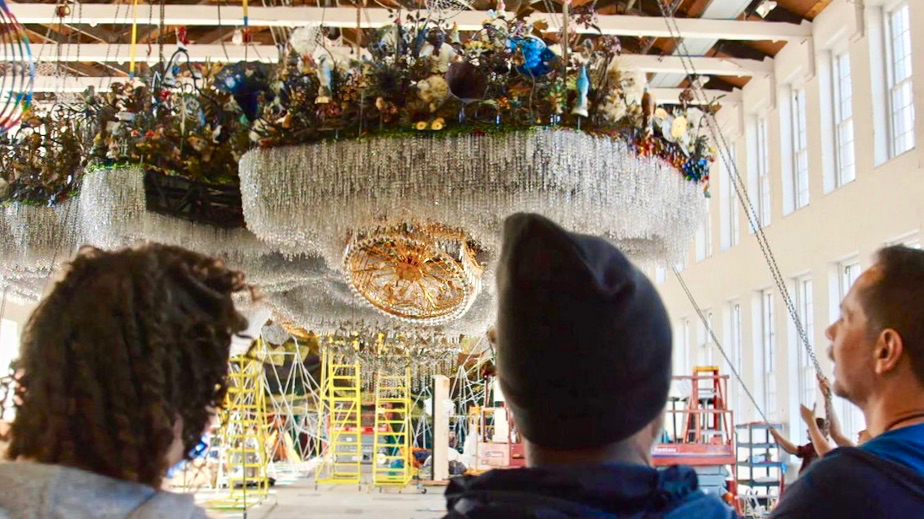Last Updated on March 12, 2021, 10:04 AM | Published: March 12, 2021
As part of its “Continuum” series of streaming films on the arts and their impact, deadCenter Film Festival presents director Jennifer Trainer’s Museum Town, a truly inspiring documentary on the transformative effect that a longshot museum had on a dying New England city.
The title Museum Town derives from “factory town,” a phrase that became loaded with tragedy in the late 20th century as companies from the mid-to-late Industrial Revolution closed manufacturing plants. Too often, those factories were the principal employer for the community, and when they closed, the communities fell victim to the ills of deindustrialization: crime, addiction and poverty.
Music and film
by Brett Fieldcamp
Sponsored by True Sky Credit Union

The massive complex of Victorian factory buildings in North Adams, Massachusetts that would become the Massachusetts Museum of Contemporary Art (MASS MoCa) started life as a textile factory. During World War II, Sprague Electric converted the complex into a capacitor factory, ultimately becoming the main employer in the city of 25,000 near the Vermont-Massachusetts border.
But as Sprague lost market share in the 1980s, the company elected to close its North Adams factory. Like other famous victims of deindustrialization like Flint, Michigan and Braddock, Pennsylvania, North Adams was left with a rotting factory, few jobs and a dying Main Street.
While the town considered the dead-ender proposal to turn the defunct Sprague facility into a prison, Guggenheim Foundation director Thomas Krens thought better of that.
Using a template for rebuilding communities through the arts that he later applied to the Guggenheim Museum in Bilbao, Spain, Krens set about the politically difficult process of selling the city and the state on the idea of a contemporary art museum in the sprawling factory.
Museum Town does not gloss over the challenges of persuading a blue-collar community to embrace such a proposal. Much like the skepticism with which many Oklahoma City residents viewed the Metropolitan Area Projects (MAPS) in the 1990s, people who spent their lives assembling capacitors at Sprague did not immediately see the value of culture as an economic tool.
In their view, massive installations by Robert Rauchenberg, David Byrne and Xu Bing would do little to lift their troubled town, but buy-in from centrist Republicans like former Massachusetts Governors William Weld and Jane Swift paved the way to greater acceptance and success for MASS MoCa.
Much of the documentary revolves around the ambitious installation of “Nick Cave: Until,” a 24,000 square-foot art piece centered on the Missouri-born visual artist’s question, “Is there racism in Heaven?”
Composed from thousands of found objects, ceramic animals, and lawn jockeys, the work is housed on a massive “cloud” of hanging crystals, juxtaposing beauty and grandeur with ugly truths about America’s past and current racism.
Cave (not to be confused with the Bad Seeds singer-composer) designed “Until” to be suspended high above the museum floor — a perfect fit for the gargantuan MASS MoCa space. From the floor, patrons only see the sparkling, silvery underbelly of the cloud, but when they climb to the top, they see the artifacts of American apartheid.
Narrated by Meryl Streep, whose visual artist husband, Don Gummer, exhibits at MASS MoCa, Museum Town’s emotional pull comes from Ruth Yarter, a nonagenarian who started work at Sprague Electric in 1943 and continued there until the factory closed. Three decades later, she served as a volunteer, taking tickets as Wilco performed as part of its Solid Sound Festival at MASS MoCa.
Toward the end of the film, Yarter, who died in 2018, is shown wandering through James Turrell’s installation “Into the Light,” which changes hues as patrons move through its spaces. Yarter admitted in the film to not fully appreciating many of MASS MoCa’s offerings, but as she ponders the shifting colors, she seems fully enveloped — like her town — in a new, cool world.
Museum Town is free and available through March 14. To view the film, go to https://watch.eventive.org/deadcentercontinuum.
George Lang has worked as an award-winning professional journalist in Oklahoma City for over 25 years and is the professional opinion columnist for Free Press. His work has been published in a number of local publications covering a wide range of subjects including politics, media, entertainment and others. George lives in Oklahoma City with his wife and son.











